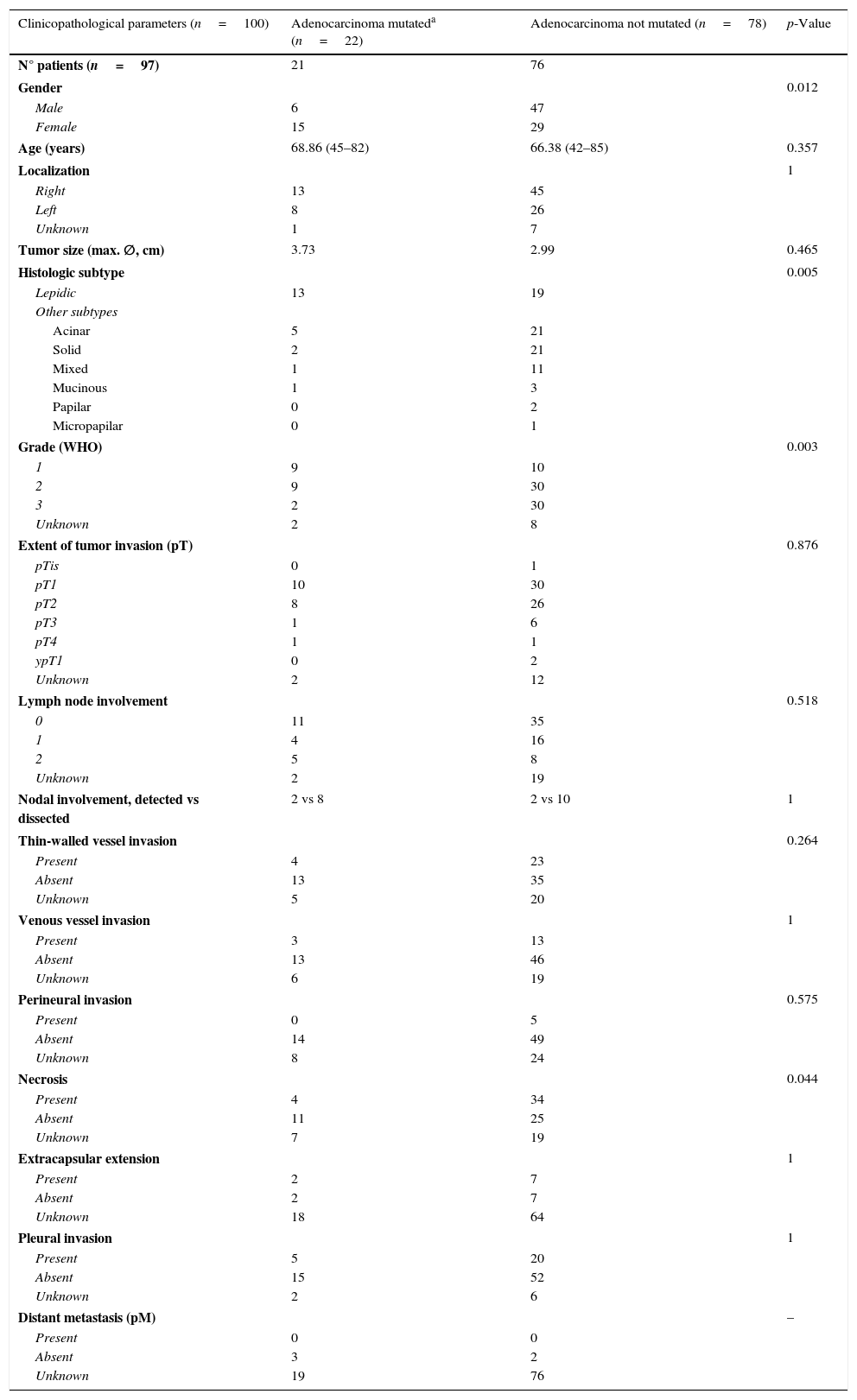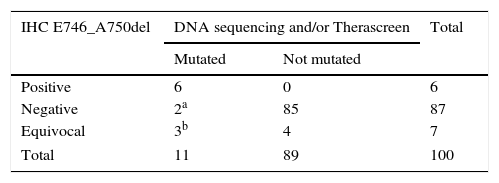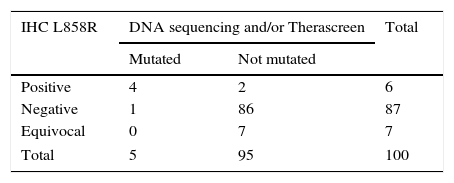The study of epidermal growth factor receptor mutations has become essential for the treatment of lung cancer. The aim of this study was to find a correlation between morphological changes and EGFR mutational status using both immunohistochemistry and molecular techniques. We also analyzed the cross-reaction of the L858R mutation-specific monoclonal antibody in cases with HER2 amplification described previously in breast and gastric cancer.
A series of 100 primary lung adenocarcinomas were examined. Exon 19 E746_A750del and exon 21 L858R mutations were studied using immunohistochemistry with two specific monoclonal antibodies. Gene mutational status was determined using real-time PCR or Sanger sequencing followed by real-time PCR when negative.
EGFR mutations were detected in 22 cases (22%) by molecular techniques, being significantly more frequent in women, low grade carcinoma and lepidic subtype, (p-value <0.05 in all cases).
In addition, in our series presence of tumoral necrosis correlated with absence of mutations.
The anti-E746_A750del antibody achieved a 100% positive predictive value and a negative predictive value of 97.7% which could restrict the use of molecular techniques to the 7% of cases with an equivocal result. The antibody for L858R mutation showed inconsistent results compared to molecular techniques, giving false positive result in two adenocarcinomas with HER2 amplification. However, its negative predictive value was very high (98.9%).
The use of real-time PCR identifies mutations not detected by the other two techniques.
These new antibodies could be useful as a screening tool prior to EGFR molecular techniques.
El estudio de las mutaciones de EGFR ha resultado ser esencial en el tratamiento del cáncer de pulmón. La finalidad de este trabajo ha sido estudiar la correlación entre los cambios morfológicos y el estado mutacional de EGFR utilizando técnicas de inmunohistoquímica y moleculares. Asimismo se analizó la reacción cruzada del anticuerpo anti-L858R en casos con amplificación de HER2 descrita previamente en cáncer de mama y gástrico.
La serie consta de 100 adenocarcinomas pulmonares primarios. Las mutaciones E746_A750del exón-19 y L858R exón-21 se estudiaron por inmunohistoquímica con dos anticuerpos monoclonales específicos. El estado mutacional del gen se determinó mediante PCR en tiempo-real o secuenciación por Sanger seguida de PCR en tiempo-real cuando resultó negativa.
Se detectaron mutaciones de EGFR en 22 casos (22%) por técnicas moleculares, siendo significativamente más frecuente en mujeres, carcinoma de bajo grado y subtipo lepídico, (p-valor<0,05 en todos los casos).
Además, en nuestra serie la presencia de necrosis tumoral se correlaciona con ausencia de mutaciones.
El anticuerpo anti-E746_A750del presentó un valor-predictivo-positivo del 100% y un valor-predictivo-negativo del 97,7%, lo que podría restringir el uso de técnicas moleculares al 7% de casos no-concluyentes. El anticuerpo anti-L858R mostró resultados inconsistentes en comparación con las técnicas moleculares, dando resultado falso-positivo en dos adenocarcinomas con amplificación de HER2. Sin embargo, su valor-predictivo-negativo es muy alto (98,9%).
El uso de PCR en tiempo-real rescata mutaciones no detectadas por las otras dos técnicas.
Estos nuevos anticuerpos podrían ser útiles como herramienta de cribado previo al estudio de EGFR mediante técnicas moleculares.












